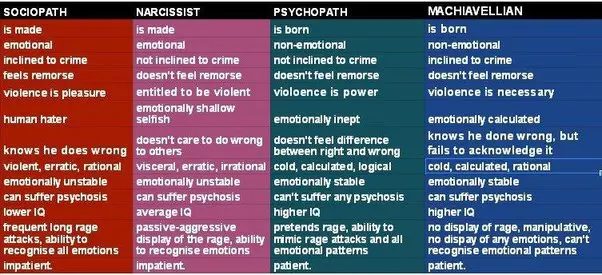No, these are not serial killers that we are used to seeing on screens. And not those people with whom we “simply” do not want to work, communicate or even be around. Before labeling everyone in a row, let’s figure out what exactly each of these concepts means.
Narcissists and psychopaths
First and foremost, every psychopath has narcissistic traits, but not every narcissist is a psychopath. Many have narcissistic traits, but those diagnosed with narcissistic personality disorder are characterized by a lack of empathy and a sense of their own grandiosity. And such people urgently need admiration from others.
Self-esteem of narcissists is lame: deep down they feel vulnerable, and therefore it is so important for them that the people around them were also insecure. Pulling the rest off the pedestal and rising against their background is their defensive tactic. When narcissists do something really bad, they wake up with faint echoes of shame and guilt, while the source of their shame is the opinion of others about them, the possibility of condemnation on their part.
And this is their serious difference from psychopaths — those do not happen to experience remorse. They don’t care if anyone gets hurt, they don’t care about the consequences of their own actions.
In addition, these people completely lack the ability to empathize, but they brilliantly manipulate others (and often seem very charming at the same time), use them to their advantage. Cunning is their middle name.
Psychopaths and sociopaths
There are many similarities between psychopaths and sociopaths — both are diagnosed with antisocial personality disorder. The key difference is that psychopaths are born, but sociopaths are made. The latter are at risk of becoming children from dysfunctional families and those who grew up in a criminogenic environment. They may not be as comfortable breaking the law and going against the rules as psychopaths, but they have lived in such an environment for too long and have begun to take these rules of the game for granted.
A psychopath builds a relationship by using the other solely for his own purposes — financial, sexual or any other. A sociopath, on the other hand, can form quite close ties, however, even in such relationships, he will behave coldly and aloofly. Sociopaths are more impulsive, it is easier to provoke a lively reaction in them.
Psychopaths are more cold-blooded and prudent, their nervous system generally reacts to stimuli differently than ours: for example, when we are scared, our heart starts beating wildly, the pupils dilate, sweat pours in a stream; we are preparing for a fight-or-flight response. You won’t even notice that a psychopath is scared. His brain functions differently, and it is still unknown what is more influenced here — genetics or environment.
Most of us tend to avoid what makes us nervous. Psychopaths don’t get nervous at all and so they just keep doing what they want. By the way, it is likely that the desire to feel at least something, at least some echo of the arousal characteristic of other people, makes them try their hand at dangerous activities — including extreme sports and activities on the verge of the criminal code and common sense. meaning.
Why is it even important for us to understand the difference between narcissists, psychopaths and sociopaths? First of all, in order not to treat everyone with the same brush, not to stick the same labels on different people. But, perhaps, it is much more important to learn to notice the signs described above in the people around you — firstly, in order to gently push them to seek professional help, and secondly, in order to be vigilant yourself and not suffer.










